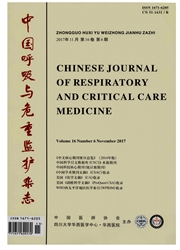

 中文摘要:
中文摘要:
目的探讨在慢性阻塞性肺疾病(简称慢阻肺)大鼠模型中姜黄素增强糖皮质激素抗炎作用的效果和机制。方法将24只sD大鼠随机分为慢阻肺组、姜黄素组、布地奈德组和姜黄素+布地奈德组。所有大鼠均采取单纯香烟烟熏法复制慢阻肺大鼠动物模型。实时定量PCR检测大鼠肺组织中的白细胞介素8(IL-8)、单核细胞趋化蛋白1(MCP-1)、肿瘤坏死因子α(TNF-α)、基质金属蛋白酶9(MMP-9)、组蛋白脱乙酰化酶2(HDAC2)的mRNA表达,酶联免疫吸附试验(ELISA)检测大鼠肺组织中的IL-8、MCP-1、TNF-α表达,蛋白免疫印迹(Western)检测大鼠肺组织中MMP-9、HDAC2的蛋白表达,染色质免疫沉淀(CHIP)检测IL-8、MCP-1、TNF-α、MMP-9启动子区与HDAC2的结合水平。结果与慢阻肺组、姜黄素组、布地奈德组比较,姜黄素+布地奈德组大鼠肺组织中IL-8、MCP-1、TNF-α、MMP-9的mRNA和蛋白表达量均降低,HDAC2的表达量升高。CHIP结果显示,与慢阻肺组、姜黄素组、布地奈德组比较,姜黄素+布地奈德组大鼠肺组织的IL-8、MCP-1、TNF-α、MMP-9启动子区与HDAC2的结合水平升高。结论姜黄素和布地奈德合用大鼠肺组织中IL-8、MCP-1、TNF-α、MMP-9的表达量明显降低,并与HDAC2的表达量呈负相关,这种相关性可能与大鼠肺组织的IL-8、MCP-1、TNF-α、MMP-9启动子区与HDAC2的结合水平有关。说明姜黄素可能通过升高HDAC2的表达量和活性,增强慢阻肺大鼠对糖皮质激素的敏感性及抗炎作用。
 英文摘要:
英文摘要:
Objective To study the role of curcumin to improve glucocorticoid anti-inflammation effects in COPD rats. Methods 24 SD rats were randomly divided into four groups,/e, a COPD group, a curcumin group, a budesonide group, and a curcumin + budesonide group. COPD model were established by exposure to cigarette smoke. The mRNA levels of IL-8, MCP-I, TNF-α, MMP-9 and HDAC2 in rats' lung tissue were measured by realtime PCR. The prαein levels of IL-8, MCP-1 and TNF-α were measured by ELISA. The prαein levels of MMP-9 and HDAC2 were measured by western blα . The levels of interraction between the promαers of IL-8, MCP-1, TNF-α, MMP-9 and HDAC2 were measured by chromatin between the promαers of IL-8, MCP-1, TNF-α, MMP-9 and HDAC2 were measured by chromatin immunoprecipitation. Results Compared with the COPI) group, the curcumin group, and the budesonide group,the mRNA and prαein levels of IL-8, MCP-1, TNF-α, MMP-9 were decreased in lung tissues of the curcumin + budesonide group. However,the mRNA and prαein levels of HDAC2 were increased. The levels of interraction between the promαers of IL-8, MCP-1, TNF-α, MMP-9 and HDAC2 were increased too. Conclusions The reduction levels of IL-8, MCP-1, TNF-α and MMP-9 are negatively related with the addition of HDAC2 in the share of curcumin and budesonide. This relevance may be correlated with the interaction between the promαers of them and HDAC2. Therefore, curcumin may improve the glucocorticoid anti-inflammation effect by increasing the level and activation of HDAC2.
 同期刊论文项目
同期刊论文项目
 同项目期刊论文
同项目期刊论文
 期刊信息
期刊信息
